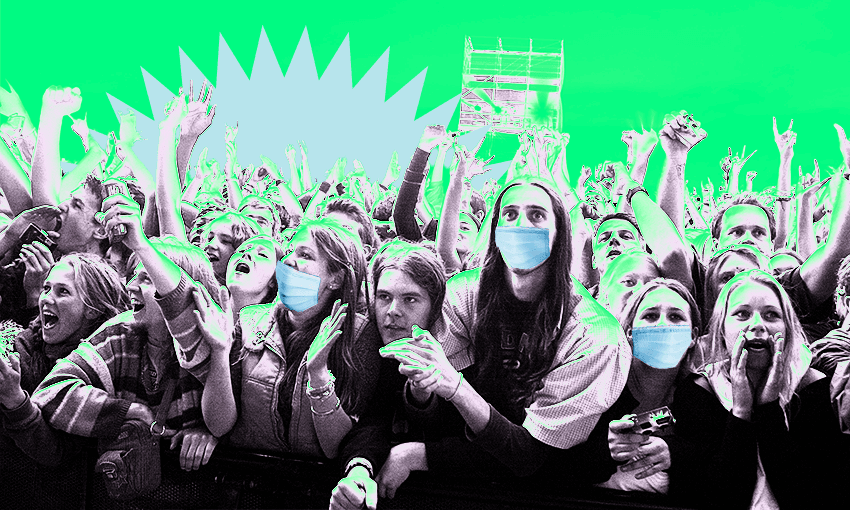Restrictions have eased and concerts are making a comeback. Who’s coming, what will those shows look like, and will they still happen in the age of omicron?
Pop stars and A-list chart-toppers don’t sit in traffic. No one thinks of them as people who sit at a standstill, patiently waiting to get to their destination. With access to personal assistants, chauffeurs, helicopters and private jets, they don’t have to cope with the same things us plebs deal with on the daily.
But stuck in congestion is exactly where they are, says Paul Dainty, the veteran Australasian promoter responsible for bringing some of the world’s biggest acts to New Zealand. “There’s a gridlock of acts trying to tour,” says the man who has delivered Prince, Jerry Seinfeld, U2 and the Rolling Stones to a stage near you.
“Every act in the world has not been on tour for two years. It’s the way they make their living … there’s a traffic jam.”
That’s will be music to the ears of local music fans who’ve largely gone without big stadium shows, music festivals and arena concerts since Covid-19 arrived in the country.
Among the effect of a quick-spreading virus: closed borders, shuttered venues and gathering restrictions. The impacts on an already-strained industry are well documented: venues going out of business, artists leaving to find more stable lines of work, and those behind-the-scenes quitting and heading for greener pastures.
Aside from a handful of fluked MIQ spots scored for international acts, local artists have populated the bills of shows and festivals for the past two years — when they’ve been allowed to.
All that’s about to change. Speaking shortly before Thursday’s traffic light changes that ended indoor gathering restrictions, Dainty told The Spinoff he had a long list of shows ready to confirm, all on hold waiting for the government’s green light. “There’s a pile of stuff,” he teased, “a long list of other acts we imminently want to announce.”
Dainty’s already confirmed two stadium shows from reformed rockers Guns N’ Roses later in the year, a concert originally scheduled for November 2021. “That is all on track. It looks good,” he says. Axl and Slash’s relationship remains strong and they’re raring to go. “The band is excited about coming down here. They love it down here. That’ll be good.”
Among Dainty’s other tours are Australian comedian Celeste Barber, Postmodern Jukebox, 2 Cellos and comedian Chris Rock, who’s due down under in August for his first shows here since Will Smith slapped and abused him during the live Oscars ceremony. “He’s taken it to another level,” says Dainty, knowing he’s got a probable sell-out on his hands.
Now the gathering restrictions have lifted, he can also announce new dates for two sold out Kings of Leon shows, postponed indefinitely since their original date in March, the peak of New Zealand’s omicron outbreak.
But Dainty’s just one promoter bringing artists to New Zealand. Things really kick off in July when more than a dozen Splendour in the Grass performers play side shows in New Zealand for Live Nation, including Tyler, the Creator, Jack Harlow, Maxo Kream, Tierra Whack, Wet Leg and Liam Gallagher.
Further afield, big name pop stars Billie Eilish, Dua Lipa and Justin Bieber are set to return, as well as a fully rescheduled Lorde tour, and performances by Alanis Morissette, Tame Impala, The Killers, Backstreet Boys and Tash Sultana. Coldplay has teased a series of Australasian stadium shows, but is yet to confirm dates. (Foo Fighters have cancelled their NZ shows following the tragic death of drummer Taylor Hawkins.)
Concerts are making a comeback, but is Dainty confident that his shows, and everyone else’s, will be allowed to go ahead? “I am,” he says. He points out the economic benefits of bringing international shows here, and believes it’s time to get on with life. “It stimulates many sectors of the economy: International flights on Air New Zealand, hotels for days and days for 100 people, sound and light companies get employed, caterers get employed, hire car companies get employed, labour forces en masse get employed.
“A huge amount of the money we generate form these shows is sent straight back into the New Zealand economy.”
The music industry last peaked in 2019, when newspapers ran headlines like “Summer of Boom” thanks to the sheer number of concerts, artists and festivals being held around the country. That season was called “the busiest summer I’ve ever seen, absolutely, hands down,” by one promoting veteran. It was a time when it felt like every second day another international artist was playing on a stage somewhere in the country.
It’s hard to remember times like that after two years of lockdowns and restrictions, but Dainty believes we’ll get back to that — in time. “I still think we’re in for another year before things truly settle down, into 2024,” he says.
Some changes to concert vibes could be evident too. Dainty believes mask use will remain widespread, especially at indoor shows. And if you’ve noticed an increase in ticket prices lately, there’s a good reason for that: yes, that pesky supply chain is to blame again. “International freight has gone crazy,” says Dainty. “The supply chain issues that’s triggered, freight costs, sea and air … that’s had an impact.”
Dainty admits the last two years have been “challenging” and he’s had more spare time on his hands than ever in his career. But after two years of closed borders and cancelled shows, he happy to be back in business. “It’s gone from relatively quiet to going nuts,” he says. “There’s not enough time in the day to deal with everything.”



